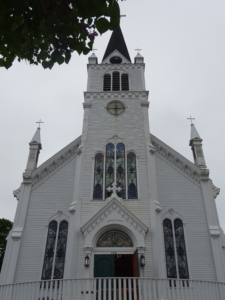
In 1670, Father Marquette established a mission on the island.
One of the original divides between Catholics and Protestants centers around the authority of the Pope. Five hundred years after Martin Luther’s 95 THESES (1517), most of what we know about the Pope comes from the news or Facebook. He lives in…..Italy? He rides in the…POPE-MOBILE? He wears…capes and red shoes? He makes…rules for Catholics?
The word “pope” comes from the Latin papa. Pope Francis currently fills the CHAIR of SAINT PETER as the 266th leader of the Catholic Church. The Pope is also referred to as “Vicar of Christ,” “Bishop of Rome,” and “Holy Father.” Catholic belief in this figure of authority is based on Jesus’ words from Matthew 16:18 (establishing, in Catholic tradition, Peter as the first Pope): “And I tell you, you are Peter, and on this rock I will build my church…..” (ESV)
My future son-in-law (majoring in Theology at a Catholic college) described it this way: “Christ further promised the gates of hell would never prevail against the Church. So, the Pope is the Christ-placed cornerstone of the Catholic Church, the servant of servants of God.”
The Papacy is housed in Rome because St. Peter was martyred and buried there. Today, Vatican City is officially recognized as the smallest independent nation in the world. It is geographically located within the nation of Italy, an island unto itself within the city of Rome. It has its own flag, government, economy, and personal security (SWISS GUARD).
The Pope is the central figure of Catholic unity and governance. Devout followers look to the authority of his position to direct and dictate beliefs and lifestyle choices. Official Church doctrine and teaching are rooted in CANON LAW and Papal decrees. Along with this, Popes are understood to have “Papal Infallibility.” Through a Protestant filter, this appears to say the Pope is perfect; everything he declares is to be blindly accepted as truth. Through a Catholic lens, the infallibility lies in the position of the Pope to uphold the true teachings of Christ. It is explained as the Holy Spirit’s way of protecting the Pope (and through him the Church) from error, thereby fulfilling Christ’s promise that the gates of hell would not prevail. (Again, Matthew 16:18)
Because the hierarchy and history within most Protestant churches isn’t so far-reaching, this can be hard to understand. Most Protestant churches don’t have extra-Biblical rules or laws governing practices and moral standards. This isn’t to say these things don’t exist. Rather, they are reflected in specific denominational differences and viewed more as “beliefs” than “law.” For example, Seventh Day Adventists uphold the traditional Sabbath (our Saturday); certain Baptist denominations forbid dancing; and many Mennonites believe women must wear dresses.
While Catholics submit to the spiritual authority of the Pope (current and past), Protestants would say the Holy Spirit directly fulfills that place in their life. From that point of difference, a commonality unites all Christians. We need each other as we walk this journey of faith. We need personal prayer and Bible study to mature and bear fruit. We need solid teachers and preachers to challenge and educate us. We need faith-based books, movies, and music to encourage and inspire us. We need opportunities to be the Hands and Feet of Jesus. Ultimately, in different ways, we seek to know and understand God’s will for His followers and to be the Light of Jesus in a dark world.
95 THESES: Martin Luther’s response to the practice of selling “Indulgences” which ignited the Reformation
POPE-MOBILE: Specially designed vehicle the Pope rides in for public appearances
CHAIR of SAINT PETER: Ornate chair the Pope sits in. Symbol of Papal Authority derived from the Apostle Peter. Once believed to have actually belonged to Peter.
SWISS GUARD: Small military unit who protects the Pope and the Vatican. Yes, these young men come from Switzerland.
CANON LAW: Complete set of ordinances, principles, and regulations governing the Catholic Church
